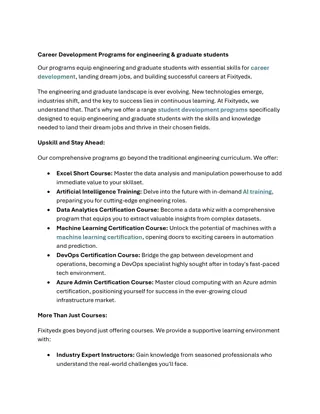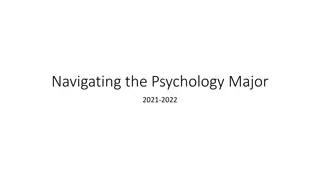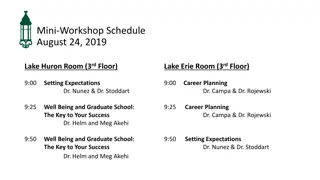Stepping Into Graduate School in Psychology: Exploring Different Areas and Career Paths
Graduate study in psychology requires a deep understanding of the various types of degrees and career opportunities available. From clinical psychology to mental health practitioners and providers, delve into the diverse areas of psychology, such as school counseling, industrial/organizational, and behavioral neuroscience. Learn the distinctions between clinical psychologists and master's level therapists, and consider the different training and work settings within the field.
Download Presentation

Please find below an Image/Link to download the presentation.
The content on the website is provided AS IS for your information and personal use only. It may not be sold, licensed, or shared on other websites without obtaining consent from the author. Download presentation by click this link. If you encounter any issues during the download, it is possible that the publisher has removed the file from their server.
E N D
Presentation Transcript
Stepping into Graduate School in Psychology APRIL 1, 2021
Related image Types of Graduate Programs in Psychology Dr. Arturo Hernandez Professor of Clinical Psychology
Where do I begin? Graduate study is a major commitment First, understand the different types of degrees and what each entails Consider how different degrees align with your individual career goals
Which areas of psychology interest you most? School Clinical Counseling Industrial/Organizational Community Social/Personality Health/Pediatric Developmental Forensic Cognitive Behavioral Analysis Behavioral Neuroscience
Clinical Psychology Clinical psychology focuses on understanding, diagnosing and treating mental disorders including substance abuse, depression, anxiety, autism, etc. Clinical psychologists are doctors trained both to conduct research and provide assessment and treatment services. They develop, administer and interpret cognitive and personality tests, diagnose mental illness, design, test, and implement treatments. Psychologists are also experts in psychometrics, or psychological measurement. They develop and administer tests to evaluate cognitive ability or mental status.
Types of Mental Health Practitioners Psychologists clinical, counseling, school Counselors/therapists Social Workers Psychiatrists
Types of Mental Health Providers Psychologists Doctoral Degree in Psychology (Ph.D. or Psy.D.) Counselors/therapists Master s Degree in one of several fields including psych, social work, education Psychiatrists Medical Doctor (M.D.) Social Workers Master s (or Doctorate) in Social Work
Clinical Psychologist vs Master s level Therapist Psychologist (Ph.D.) Therapist Degree Doctoral Masters Years of Training 5-7 2-3 Focus of Training Research, Teaching, and Practice Practice Primary Work Settings University Research Institutes Private/ Group Practice Community MH Centers Medical Centers Government and Health Agencies Private/Group Practice Group Practice Community MH Centers Medical Centers Need to be licensed? Maybe Yes
PsyD (Doctor of Psychology) PsyD (Doctor of Psychology) The PsyD degree was developed in the late 1970 s as an alternative to a PhD in clinical psychology A PsyD is intended for those interested solely in practicing psychology These programs require fewer research and statistics courses and may not require a final dissertation research study A PhD is intended for those interested in generating new knowledge through scientific research, teaching, and/or practicing psychology These programs include multi-focused training that prepares students to work in a broader range of settings and roles.
Psy.D. vs. Ph.D. Psy.D. Ph.D. Years of Training 4-6 5-7 Focus of Training Practice Research, Teaching, Practice Funded during school? No Yes Typical annual costs $25,000 - $60,000 $0 - tuition waiver plus stipend for teaching or doing research Typical debt upon graduation $200,000+ <$50,000 % applicants offered admission 50% or more 2-10% Setting For profit professional schools Universities Career Options Narrow More Broad
What can Clinical Psychologists do? Research generate new knowledge Teaching undergraduate, graduate and professional level Program Development and Evaluation Community-based prevention programs Inpatient treatment protocols Consultation Clinical, medical, forensic, etc. Clinical Practice
Things to consider about a Ph.D. in Clinical Psychology Make sure program is APA accredited Very competitive Need to plan ahead - excel academically, acquire research training, strong letters of support Mentored training Students work with an individual faculty member- good matches are based on shared research or clinical interests Completion of a masters thesis and doctoral dissertation under the supervision of a mentor
Things to consider about a Ph.D. in Clinical Psychology Includes ongoing clinical training Culminating with a one year full-time internship Focus is on conducting research Designing studies, collecting data, analyzing results and publishing findings in scientific journals You will not be allowed to work outside of your PhD program You wont have time anyway!
Counseling Psychology Programs train students to become professional practitioners of psychology, working in a variety of counseling settings. Clinical psychologists study and treat mental health disorders, whereas counseling psychologists focus career issues, life transitions and overall well being Training is very similar to Ph.D. in clinical psychology Similar in length, research and clinical training, thesis and dissertation requirements, and culminating with a one year full-time internship
School Psychology School psychologists primarily work in public school setting to: Assist educators in implementing effective learning environments Conduct research about effective instruction, behavior management, alternative school programs, and interventions Assess and evaluate children s school-related problems and needs Intervene directly with students through individual counseling, support groups, and skills training A master's degree and state licensure are required for entry-level school psychology positions. Students with interests in conducting research or teaching at the university level need a doctoral degree.
Masters in Counseling Many types of programs in this category Typically a two year degree Master of Education (MEd) in Counseling: programs are typically designed to develop skills relevant to a wide range of careers in social service and mental health agencies. Masters in Counseling Psychology: programs prepare graduates for research, teaching and/or counseling in a variety of settings. Masters in School Psychology: programs prepare students to work in schools or private practices with a focus on academic testing.
Doctoral programs in the Houston area (accredited) Ph.D. in Clinical Psychology UH (Department of Psychology) Sam Houston State University Texas Tech University Ph.D. in School Psychology UH (Department of Psychological, Health, and Learning Sciences) Ph.D. in Counseling Psychology UH (Department of Psychological, Health, and Learning Sciences) Texas Tech University Psy.D. in Health Service Psychology UH Clearlake - combined clinical/school program Psy.D. in Counseling Psychology Our Lady of the Lake University
Social Psychology The field of social psychology is concerned with understanding individual behavior in a social context. The work of social psychologists allows us to better understand how group dynamics influence our choices and actions, and provides insight into how our social perceptions affect our interactions with others. Example topics examined include personality, social cognition, group processes, prejudice and discrimination, attitudes, conformity, and stereotypes Social psychologists most often work at academic institutions, but may also work for government agencies, non-profit organizations, hospitals, and private companies.
I/O Psychology Industrial/organizational psychology focuses on studying human behavior in organizations and the work place. I/O psychologists address issues related to recruitment, selection, training, performance eval, workplace motivation and reward systems, quality of work life, and consumer behavior. Most I/O psychologists work in organizational and workplace settings (manufacturing, commercial enterprises, labor unions and health care facilities). They may also work as independent consultants, called into an organization to solve a particular problem. Other I/O psychologists hold academic positions in colleges and universities.
Cognitive Psychology Cognitive psychology is focuses on the study of mental processes such as attention, language, memory, perception, problem solving, creativity, and thinking that impact behavior. Cognitive psychologists conduct experiments to understand how the human mind takes in, processes, acts upon, and recalls inputs received from the outside world. Many practical applications - Information gained in this area is used in applied fields of psychology (clinical, social) and in the creation of educational materials and software design. Cognitive psychologists work at colleges and universities, government agencies, corporate businesses and in private consulting.
Developmental Psychology Developmental psychology focuses on how and why human beings change the ways they think, feel, and behave over the course of their life. Study a broad range of topics including motor skills, executive functions, moral understanding, language acquisition, personality, emotional development, and identity formation. Developmental psychologists work in academic settings, government agencies, health care facilities and schools. Some developmental psychologists focus on working with a specific population such as developmentally delayed children.
Behavioral Neuroscience Behavioral neuroscience (biological psychology) is the application of the principles of biology to the study of behavior. Behavioral neuroscience research conducted in non-human species (e.g., rats, monkeys) and humans Advanced techniques used in research include pharmacological manipulations, surgical procedures, electrical stimulation, fMRI, genetic mapping, etc. Direct contributions to the understanding of brain-based disorders, including Parkinson's disease, Alzheimer's, severe depression, schizophrenia, autism, and drug abuse/alcoholism.
Graduate Programs at the University of Houston Department of Psychology (College of Liberal Arts and Social Sciences) Ph.D. in Clinical Psychology Ph.D. in Social Psychology Ph.D. in I/O Psychology Ph.D. in Developmental, Cognitive and Behavioral Neuroscience Department of Psychological, Health, and Learning Sciences (College of Education) Ph.D. in School Psychology Ph.D. in Counseling Psychology Master of Education in Counseling























